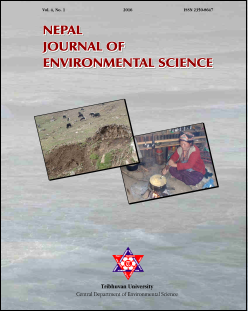Need of recognition of traditional institution and use of indigenous knowledge in climate change adaptation: A case-study in Mustang district, Nepal
DOI:
https://doi.org/10.3126/njes.v4i0.22725Keywords:
Climate change adaptation, Integration, Mukhiya, Scientific knowledgeAbstract
Contemporary researches have revealed that traditional institutions are very strong in governing natural resources. They possess rich pool of indigenous knowledge which is valuable to adapt extreme environmental conditions. On the other side, it is less studied about how indigenous knowledge can be used and how traditional institutions can be mobilized in planned climate change adaptation initiatives at local level. In the mean time, Mustang district has prepared climate adaptation plans for all communities and declared as the first district to have such plans. On this backdrop, this study has explored climate change, state of adaptation and role of traditional institutions impacts in Mustang. The findings of the study revealed that climate change in Mustang is at much faster pace than in other regions. Local people have practiced autonomous adaptation and used indigenous knowledge in diversifying livelihood opportunities. The traditional institution- Mukhiya and mother groups have played important role in adaptation process through good governance of critical natural resources- forest, land and water. They practiced equity in participation and benefit sharing. The planned adaptation process has initiated by formal institutions following a participatory approach. But, these adaptation plans have neither recognized the role of Mukhiya nor mentioned about the use of indigenous knowledge in adaption processes. This paper concludes that indigenous knowledge integrated with scientific knowledge; and mobilization of traditional institutions together with formal institutions can excel adaptive capacity development in efficient and more sustainable way. Thus, this paper urges for formal recognition of traditional institution and integration of indigenous knowledge in planned adaptation initiatives.
Downloads
Downloads
Published
How to Cite
Issue
Section
License
This license enables reusers to distribute, remix, adapt, and build upon the material in any medium or format for noncommercial purposes only, and only so long as attribution is given to the creator.




